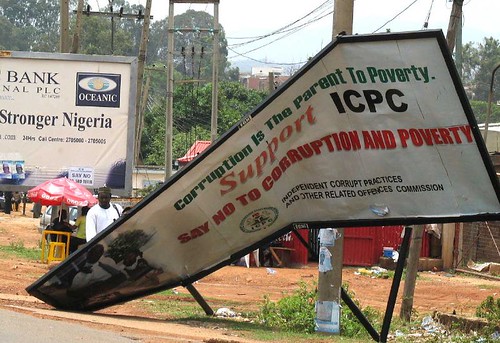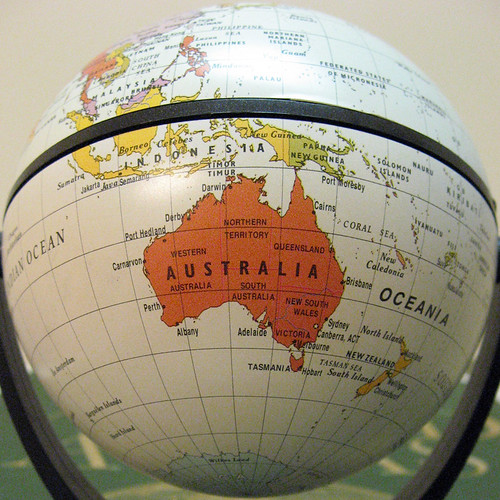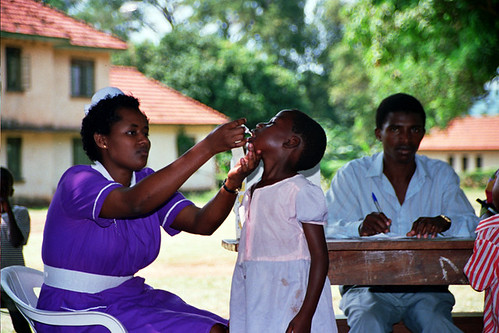- CESVI is looking for a logistician/administrator for Herat (Afghanistan) and a logistician for Vavunya (Sri Lanka). Can somebody please explain to them why this picture really should not be used?
- The IRC apparently is looking for a logistics manager for Kenya. ‘Apparently’, because I have not been able to find this vacancy on the IRC’s own website.

Michael Kleinman continues to publish one of the most thoughtful and insightful blogs on aid work on his ‘Humanitarian Relief’ mini-site at change.org. This should be on your required-reading list if you are in any way interested in humanitarian relief.
One of his more humorous postings deals with allegations of corruption towards InterSOS, an Italian NGO that (mis)handled a hospital project in Afghanistan. Whether or not InterSOS mishandled the project itself, one thing is sure: they definitely made a mess of the PR side of things.
So what are some lessons that we can learn?
- Make sure that you can articulate the added value of your organisation in every project. InterSOS has left the damaging impression (warranted or not) that they have skimmed off a large part of the available funds for the project without being able to demonstrate what they have delivered in return.
- Make sure that you can communicate the measures that you have taken to minimise fraud and corruption. Make sure that your logistics processes address these issues, and that you are able to tell how they do. InterSOS has never been able to tell us what exactly they did to avoid fraud and corruption.
- When addressing allegations like this, taking legal action is usually counterproductive. InterSOS mentions that they have started legal proceedings seeking compensation. Whether they will be succesful is an open question to me (I just love that pithy acronym IANAL), but I am pretty certain that the negative effects of their litigation (cost, loss of reputation) will easily outweigh the funds recuperated (if any).
- Never, never, never require that anything is ‘taken from the internet’. It won’t happen. Yes, The Guardian has removed the video, but copies are archived in many other places (e.g. Michael Kleinman’s blog, as well as YouTube). You will not be able to eradicate whatever is published about you, but you will succeed in giving the impression that you have something to hide. It is much more effective to ask for a rectification on the same page — if The Guardian would have distanced itself from its reporter on the same page as it published the video, things would have looked decidedly different.
- If you publish a press release in a language in which you are not fluent, make sure it gets copy-edited by somebody who is. InterSOS’ press release is a terrific example of Italish, and as such is rather funny, but it does not leave a very professional image — and that is putting it mildly.
Any additions? Experiences from readers who have been confronted directly with this sort of media scrutiny?
(Photo: Anti-corruption sign by Mike Blyth. Some rights reserved.)
{I must admit that I am guilty: I have brought my Dell computer into Sudan — and out again, I am happy to say. But in doing so, I was in technical violation of various US export regulations. Over at Aid Worker Daily, Jon Thompson warned us about this already some time ago. I know that at least one international NGO decided on not buying Dells because of these regulations, even though they actually were otherwise the best for their organisation (they seemed to forget that almost every computer these days has regulated technology on board, even if it’s only wifi, so this was a particularly pointless exercise).
You might say: what does that have to do with me? I am not in America, my organisation is not incorporated in the US, what can the US government do to me? The problem here is that the US claims extraterritorial jurisdiction in many areas, of which this is one. When you bought your laptop or router, somewhere in the small print a clause was hidden stipulating that you would not export the technology to any country that is in the US’ bad books. Still, if you feel that you are untouchable for the US government, go ahead. I am sure SportingBet, a UK internet gambling site, felt much the same — until US law enforcement arrested their chairman. And don’t forget that many international NGOs get a large part of their resources from the US…
So what can you do? I see a couple of options:
- Not use any regulated technology in prohibited countries. Might be an option for some organisations, but in view of the array of these technologies this is simply not an option for the (vast) majority of us.
- Go the official route: get a license. Not easy, it needs expert legal input, it is a lot of work, and how are you going to do that in the throes of an acute emergency response? And one can wonder whether you will actually get a license for export to e.g. Sudan… although leveraging public opinion might force BIS to relent.
- Keep your fingers crossed, go ahead anyway, and (again) plan to use public opinion if things do go pear-shaped and your CEO is arrested the moment she sets foot on US soil.
Whatever you choose to do, make sure it is a conscious choice: don’t get caught on the hop.
{A short update on my previous posting: the Viva Gaza convoy apparently arrived yesterday (or today, depending in which time zone you are) in Gaza — which makes it the first succesful privately organised aid convoy of this size.
Although… my friend and fellow humanitarian Paras Valeh points out that, back in 1995, a privately organised aid convoy negotiated its way from London to Bosnia. Apparently the convoy was organised by UCL Medical School students. I have tried to find some further information on this convoy, but so far without luck. Anybody who would be able to shed some light?
{And sometimes, just sometimes, I see so much hope in a small newspaper article.
I don’t think that many people will have noticed the almost historical occasion celebrated in a recent article in The Jakarta Post. Indonesia is not the poorest country on earth, yet it is definitely not in the same league as Australia. However, the recent bushfires in the Australian state of Victoria have caused the unprecedented: Indonesia gave international aid to its southern neighbour. Sure, we are talking about US$ 1 million, which is not a huge amount by any standard of international aid, but just this idea is so hopeful: a country that is still on its way to prosperity and not that long ago was recipient of massive aid, is now able to give some of this same aid to a country that is in the top-20 of the most prosperous countries in the world.
Perhaps we are finally getting somewhere.
(With thanks to Cempaka Projects for putting me on this trail.)
(Photo courtesy of Duncan Cumming. Some rights reserved.)
{I don’t know. And I suspect that those who pretend they do[1], don’t know either.
I don’t think it will have escaped anybody’s notice (or at least anybody who would read this blog) that the ICC issued a warrant for Al-Bashir’s arrest. Nor will it have gone unnoticed that he retaliated swiftly by expelling at least 13 international aid organisations from Sudan. The discussion whether or not the warrant is A Good Thing is raging across a million, million blogs (well, a couple of hundreds at least), with most pro- and opponents presenting their viewpoints with astounding assuredness that they know what is Right[2].
To reiterate: I just don’t know. I am angry and sad, but that is angry with Al-Bashir and his cronies, and sad for the Sudanese population. But there is more to this.
At the last count, I have worked in over 30 countries. None of them is able to get at my emotions like Sudan does; and none save Sudan has made me decide that I never want to go back. Sudan is is blessed with a population that comprises some of the best, noblest, and nicest people I know. It has also produced some of the most callous, cruel, and abhorrent people I know. The strangest thing: the two groups overlap largely — and that is something that I have only experienced in Sudan. I don’t think that there are many countries where it is normal that the same colleague who risks his life trying to get a couple of very sick kids out of a incredibly tight spot, will tell you at some other occasion that he feels that all [fill in your favourite ethnic/cultural group] should be exterminated, and that he would not hesitate to pull the trigger if he had the chance. Yes, it happens occasionally in other countries as well, but as an everyday matter of course? Only in Sudan.
Sudan is one of the most complicated, intractable settings I know; and I find anybody who pretends that they know what is best for the Sudanese highly suspect.
(Photo courtesy of Ammar Abd Rabbo. Some rights reserved.)
Footnote
[1] In my original draft (which, I am glad to say, I let cool for a day or so before publishing), I had a couple of links to some of my co-bloggers here. But what’s the use? You know who you are.
[2] No, I haven’t suddenly contracted capitalitis; this is a result of the way this occasion seems to be celebrated with discussions that usually feature Ideas With Capitals.
[3] With apologies to Wronging Rights for the blatant plagiarism
- UNICEF is looking for a senior logistics consultant for Sudan (Juba)
- OXFAM GB is looking for a country logistics manager for Uganda
If you are interested in logistics, health, and aid, the United States Naval Institute (USNI) blog is a wonder. Really.
The more-or-less recent attention in military circles for soft power means that the USNI is also more and more interested in how the Navy can be involved in aid, in order to win hearts and minds (force multipliers[1], anyone?). Of course, the US Navy is also one of the biggest logistics operations in the world (hey, logistics originally is a military science). So of course the USNI can be a source of fascinating stuff about the two.
One of those little gems was published a couple of weeks back. As the Navy is actively involved in catching those elusive Somalian pirates, some people are getting worried what an outbreak of e.g. MDR-TB, brought across by captured pirates, could do on a closely-packed military vessel. The stuff of nightmares, apparently, and they even quote MSF to support that. Luckily a commenter makes clear that TB is not that easy to transmit, but still…
My first posting ever on this blog was about the threat to aid (and hence to population health) posed by Somalian pirates. Apparently that threat goes further than that, and Navy sailors can be threatened by more than bullets.
(Picture: Arrrgh! | Pirates by Joriel “Joz” Jimenez. Some rights reserved.)
Footnote
[1] I find it curious that nobody noticed that Powell used the term ‘force multipliers’ routinely — he even had a personal rule: “[p]erpetual optimism is a force multiplier.” So his description of aid organisations as force multipliers might actually have been a lot less meaningful than it has been described. Still not a smart thing to say, though.
{Continue Reading 1 comment }Aid and aid work, Logistics, Public health, The light(er) side
- UNICEF is looking for a contract officer and a contract specialist (vaccine analyst)
- ACF Spain (or ACH) is looking for logistics coordinators in Lebanon, the Palestine territories, and the Sahel region.
An interesting article in the Ugandan newspaper The Daily Monitor, warning for a possible new polio outbreak. The most interesting part came almost at the end:
Dr Zaramba [the Director General of Health Services; MK] said the health ministry has enough vaccines to roll out an emergency vaccination exercise for children below five years later this month and in April. …
However, Dr Mbabazi [a risk analyst at the WHO country office; MK] said there are “serious health system and bureaucratic problems” that have led to the re-emergence of polio in the country that need to be fixed “real fast”. He cited bureaucratic delays that stopped the government from responding quickly to the WHO warning.
He said, “They are now talking about this upcoming emergency vaccination but as far as I know, there is no money for logistics to do it on a massive scale. Yet it is the best that can be done under the current circumstances.”
Let me reiterate this:
- Seven million Ugandans are at risk of contracting polio
- There are sufficient vaccines to vaccinate all of them
- But: there is no money to arrange the logistics of a vaccination campaign.
Yet another example of how ignoring health logistics will lead to disastrous consequences. When will we start to integrate logistics in our health planning?
(Photo: Polio immunisation in Jinja, Uganda. Courtesy of Richard Franco. Some rights reserved.
{





